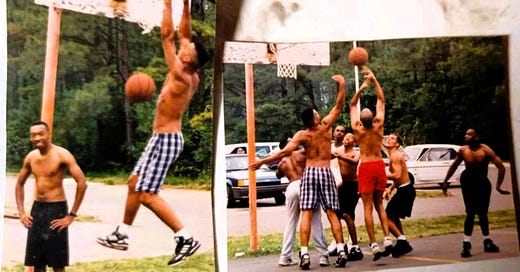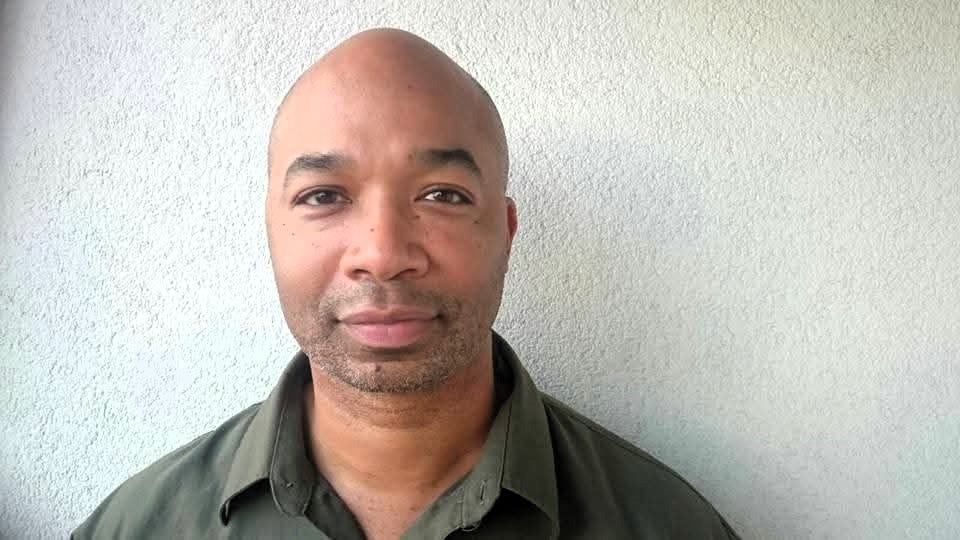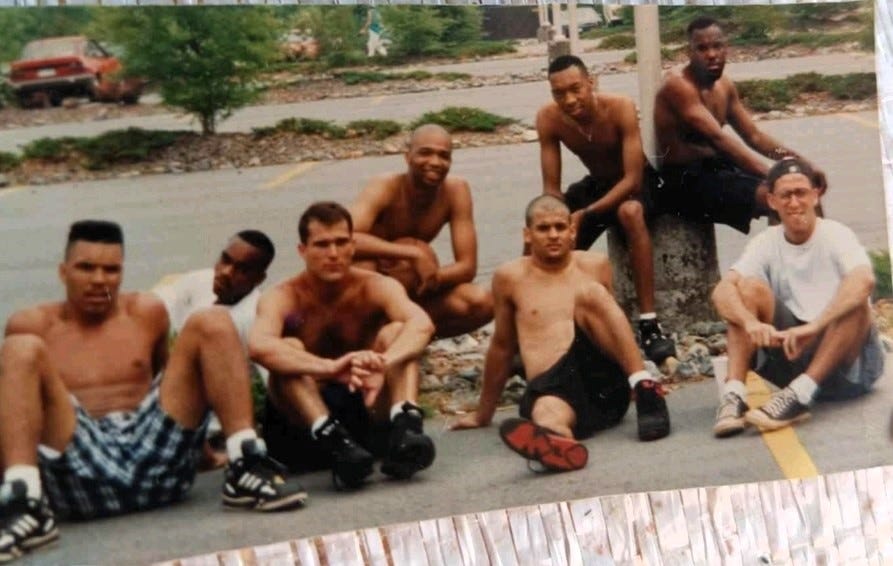For the Abbey, it's all about community
Alum holds Abbey memories close, says school made him adaptable
Jerald Callaway’s pictures of his Abbey friends hooping it up near the first Cuthbert Allen apartment. (Photos courtesy of Jerald Callaway)
Ultimately, Belmont Abbey College’s small school atmosphere attracted Jerald Callaway and many others.
Callaway drew close to the small degree program, the basketball team, and the Black student community from 1989 to 1993. Those things he wouldn't trade in 30-plus years later.
The small-town North Carolina teen wanted a college close to home and Charlotte. His hometown was so small that the 1990 U.S. Census said there were less than 300 Black residents in Elkin. His senior class consisted of 89 students, and just 10 percent of them were Black.
Belmont Abbey College had even fewer minority students.
“We only had, at the most, 30 Black students on campus at one time during my whole four years there, (so it was) a very small group," Callaway said. “By default, we were kind of like a community within ourselves, helping each other out. You know, especially the upperclassmen, giving the lower classmen knowledge.”
That support system, backed by peers, monks, and professors, led to a Bachelor's degree in Political Science and an impressive career that included a stop in the Navy.
Now living half a world away in Germany, Callaway can still fondly recall those memorable years in Belmont.
‘Sure, why not?'
Callaway graduated from Elkin High in 1989 and was on the radar of schools in the days before the Internet and social media. After he took the SATs, the College Board gladly passed out his name to colleges and universities nationwide. That resulted in the postal service packing his parents’ mailbox with Abbey correspondence. Soon, admissions people invited him to a Fabulous Friday (likely the Abbey Experience now) orientation.
“(They said that) basically, you stay the weekend," he said. “And I was just like, ‘Sure, why not?’”
Surprisingly, Calloway said former Admissions Director Celia Billings wouldn't let him go during his college pursuits.
“I remember (she) called like every other week after I did my first visit,” he said. “(After that), it was just really random conversations. ...But she showed a genuine interest. And that is one of the main reasons I chose Belmont Abbey. ..(It) was just a slightly bigger transition. So that worked out for me really well.”
Hooked on Abbey's life, he applied and enrolled. A men's basketball team manager job came with long Wheeler Center hours soon followed. After shaking off some first-year transfer jitters (the University of Maryland stayed with him), he bought into four years at the Abbey.
By sophomore year, he returned with plans for a minor in political science to complement a Sociology degree. But, a last-second decision helped Callaway buck Sociology for Dr. Robert Jones’s Political Science Department.
Calloway in 2016. (Facebook photo)
Jones had an important impact on the small-town kid, one that Calloway still considers extraordinary.
“To this day, I don't know how (Jones) ended up at Belmont Abbey,” Callaway recalled. “I remember going into his office, and he has all these pictures of all these world leaders that he’s met, shook hands with, and all of that, and I was like, ‘How did this guy end up here?’ He was a brilliant man and, most importantly, a good teacher. He knew how to get the best out of his students.”
Calloway said Jones, who died in 2024, captivated his small classes.
“So, by my junior year, he knew our tendencies,” Calloway said. “He knew how to teach each of us individually in a classroom setting, which is amazing to do.”
He recalled a wealth of great Abbey professors during that time. Math professor Natalie Creed, who Callaway recalled as the only other Black teacher there, “helped me as best as she could.” While Callaway confessed his poor math skills, Creed was “very nice.”
Natalie Creed (at left) taught math at Belmont Abbey College in the late 1980s. (Spire Yearbook)
“She helped me as best as she could,” he said. “She was very nice. Anytime I went to her office for help, it was never a burden.”
Dr. Taggert, Brother Paul Shanley, and Father Lawrence Willis also made their marks with the small-town kid. He took two Shanley classes, one of which was the ever-popular, much-enjoyed film criticism class, which stood out most with many Abbey students.
“It really taught me how to look at movies differently, not just from an entertainment perspective, but how they're made — the different angles,” Calloway added. “...Brother Paul would let us bring our own movies in, and we would watch them. So he encouraged that diversity as far as film watching.”
Calloway admits that his time in class paid off, thanks to what he learned from the Benedictine liberal arts tradition.
“It's amazing how many situations where I can contribute or at least I’m not lost in a conversation or situation, and this made me very adaptable,” he said.
Connecting the past with the present
Calloway, who is not a Catholic, got his exposure to the Benedictine rule and the monks (“the first place I ever saw real monks and Catholic priests that were not on TV”), calling the experience “very eye-opening.”
“That's the one thing I can take away from it. It definitely fostered a sense of community and belonging for the most part,” Calloway said.
There were grand memories — Hurricane Hugo's destructive path, college officials bouncing students around the school for shelter during that storm and meeting superstar comedians Carrot Top and Dave Chappelle (Dave even had a beer with him) at Abbey performances. Memories of hooping it up on asphalt near the Cuthbert Allen Apartments still linger.
But one particular moment stood out: Brother Paul retelling the school’s 1969 Science Building protest.
“...It was a very random conversation at a lunch table,” Callaway recalled one day. “I don't even know what even brought it up. And I think it was probably like my junior year. He told us about it, and we all sat there. First of all, we were surprised that it had happened. Second, we were surprised that nobody knew about it, not even the upperclassmen sitting at the table. Nobody knew about it at all.”
He fondly recalled the small Abbey basketball and Black communities were “groups” that cared about each other. Others, like Wingate lacrosse coach Frank McKinney, Skip Lowe, and Mike Sumner, also stood out. Callaway remembered good times hooping it up with Abbey basketball standout Brett Walters and former player Jimmy Riches, who would give his life as a firefighter on 9/11. He also bonded with future Abbey assistant coach Lewis McClain during that time -- the two have shared a friendship for more than 30 years.
Even the Abbey girls wanted to help. Callaway called them “invaluable” to learning about the community.
“Sherry McClain and Leigh Ann Tuttle (Jerald recalls her passing five years ago), I remember my freshman year, actually the first day — they came by my suite, and it was like, ‘Look, if you need anything, let us know. (If) you don’t have a car, fine, you can use mine.’ They told me what teachers to take. It was just instant putting their arms around me, so to speak, and helping me out from a freshman who was just clueless.”
Their advice went a long way during those Abbey years, even when it came to adversity. Calloway recalled several racial incidents during a semester in the first year.
Calloway (center) takes a break from playing basketball with his Abbey friends in a photo from his time at the Belmont school. (Jerald Calloway photo)
The Black students reported the incidents to Fr. Christopher Kirchgessner, and the excessive checks soon stopped.
“But yeah, that was my first instance of being profiled because, again, at the most, there are only 30 Black students,” he recalled. “But I was having the campus police ask me for my ID two or three times a week, and I'm like, ‘Dude, we don't all look alike. You’ve already looked at my ID. You know I go here.’ That was one of the big ones.”
He recalled another incident involving loud music in his Rapheal Arthur Residence Hall room. The former student said other suites played loud music, but he remembered his suitemates getting more attention. There was “always some type of tension” with the students.
Those moments are among his college memories. But, he admits with any situation “you have some ups and downs.”
“If there's subtle treatment, there’s a lot of subtle things,” he added. “For example, again, the campus cops just... always looking; it always seemed like they were waiting for us to do something, and they were always following us around, whether we were in a group or not, even when I was with the basketball team because I didn’t initially come to Belmont Abbey for basketball.
“My freshman year, I became the manager for the basketball team. So that was kind of a community within itself. That’s a fraternity within itself, and I would see how we would get treated, especially versus some of the white basketball players, as far as them approaching us or, you know, that subtle harassment.”
Life after Abbey
Calloway left the Abbey with his diploma, destined for great things. He found a life in the Navy before a knee injury knocked him out within six months. Now, after 16 years in Germany, he runs Decretorius Consulting, a successful business and software consulting firm.
“I’ll say this: Being a political science major, especially under Dr. Jones, allows me to at least participate in a conversation about anything,” he said. “(It was) that flexibility (that enabled me) to be able to fit into just about any type of industry as far as talking or understanding.”
Would he do it all over again Belmont Abbey again 30-plus years later?
“Overall, my experience with the Abbey, I wouldn’t trade it for anything in the world,” he said. “Not just academics but the whole experience. I mean, the friends that I’ve made there. They are like family to me, even to this day. So again, I wouldn't trade the overall experience for anything in the world.”
He's heard the Abbey growing and developing, but he still embraces the school's successes and how they affected him.
“Yes, I would. Obviously, it has grown. Looking at it, the education, the different programs — the social stuff — I'm not sure of it, but I do not regret at all going there and graduating there. I've always said that, and I'll maintain that.”







